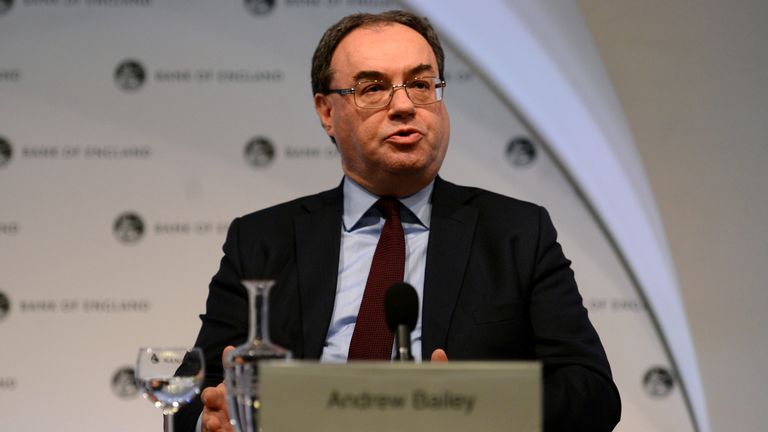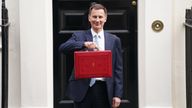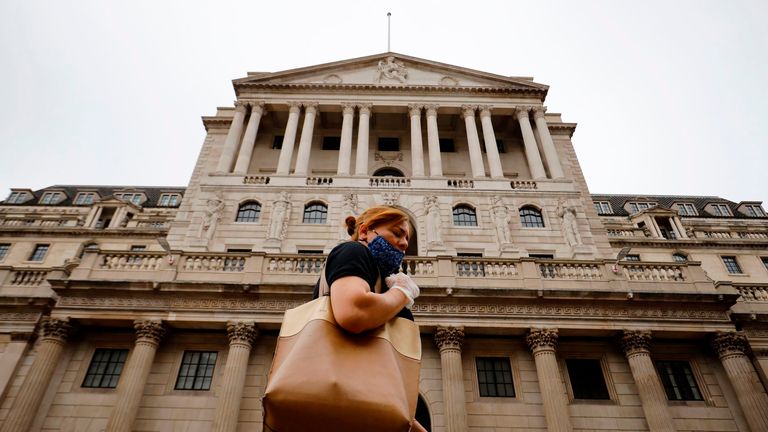BoE governor Bailey blows hole in pension superfunds regime
Andrew Bailey has warned Therese Coffey that pension superfunds could threaten financial stability, Sky News learns.
Thursday 25 June 2020 18:34, UK
The head of the Bank of England has dealt a devastating blow to the prospect of a multibillion-pound consolidation of defined benefit pension schemes by warning that a regulatory regime unveiled last week could pose a risk to financial stability.
Sky News has learnt that Andrew Bailey, the central bank's governor, has written to the work and pensions secretary, Therese Coffey, to criticise elements of an interim framework for pension superfunds announced last week by the industry regulator.
Mr Bailey's intervention, which one pensions insider described on Tuesday as "staggering", threatens to derail the launch of superfunds following a two-year battle by their proponents to get them authorised.
Supporters say that by aggregating hundreds, or even thousands, of defined benefit schemes, pensioners whose retirement savings are managed by superfunds would be better insulated from market shocks and benefit from reduced administrative costs.
Last week's launch of what The Pensions Regulator (TPR) called a "tough new interim regime" to protect savers in superfund vehicles was explicitly endorsed by Guy Opperman, the pensions minister.
Mr Opperman called the news "a big step towards a healthier and stronger pensions landscape".
"Well-run superfunds have the potential to deliver more secure retirement incomes for workers, while allowing employers to concentrate on what they do best - running their businesses," he added.
An industry source who has been briefed on the contents of Mr Bailey's letter said it was "scathing" about the potential risks to savers.
By not adhering to standards aligned with the EU's Solvency-II framework for insurance companies, the Bank of England governor is understood to have said, pension superfunds would be potential beneficiaries of "regulatory arbitrage".
:: Listen to the The World Tomorrow on Apple podcasts, Spotify, and Spreaker
Mr Bailey is said to have warned Ms Coffey that the interim standard proposed by TPR would not be adequate.
If a large superfunds sector developed during the period of the interim regulatory framework, there could be a risk to financial stability, he is understood to have added.
The criticism by the most influential figure in Britain's finance industry threatens to embarrass the pensions watchdog as well as ministers who have enthusiastically backed superfunds' emergence.
Specialist pension insurers have lobbied for years against the creation of such pension consolidators on the basis that their new rivals would benefit from a lighter-touch regulatory burden.
The Prudential Regulation Authority, which sits within the Bank of England oversees insurers, has previously expressed reservations about the framework for supervising pension superfunds.
"We have a close interest in the regulatory framework for defined benefit (DB) pension scheme consolidation because it offers economically similar financial services to annuities yet may have different standards of authorisation and prudential supervision," it said in a public response to a consultation on the issue.
"DB pension scheme consolidators could compete with PRA-regulated insurers providing annuities, and it is possible that insurance groups will operate in the consolidation market and we become the consolidated group prudential supervisor."
However, none of the PRA's public comments have been as robust as those in Mr Bailey's letter to Ms Coffey.
A TPR spokesperson declined to comment on Mr Bailey's letter specifically, but said: "We are fully alive to the risks presented by unregulated DB consolidator superfunds and other new models which are already being set up.
"Protections for savers are needed now which is why we have set a high bar for how they must show they are well-governed, run by fit and proper people and are backed by adequate capital."
The watchdog added that its modelling "illustrates that under our framework, there is a 99% likelihood that the superfund would be able to pay the benefits they are promising to members in full".
"We welcome the government's announcement that it is developing a permanent regime before introducing specific superfunds legislation."
Prominent City figures such as Edi Truell have been in the vanguard of developing the new vehicles.
Mr Truell, the founder of Pension SuperFund, said: "This constant comparison to insurance is in danger of missing the point.
"Almost no pension fund can afford insurance buyout, especially post-COVID - and yet a worrying stream of them are ending up in the Pension Protection Fund with members' benefits cut.
"Superfunds offer trustees an affordable, secure and mutually aligned option which improves security.
"The PSF only returns money to investors when members' benefits are improved."
Potential candidates for pension consolidation include Thomas Cook, which collapsed into liquidation last autumn, and Debenhams, the struggling department store chain.
In total, tens - if not hundreds - of billions of pounds of pension liabilities could be pooled in this way if the industry is allowed to develop, according to analysts.
Another emerging player in the superfunds space, Clara-Pensions, is in talks about securing hundreds of millions of pounds of new capital from investors.
The Bank of England declined to comment on Mr Bailey's letter.





